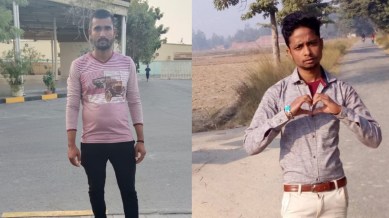Homebound: That Covid story continues, in the friend who lived
Three years after the story of Amrit’s death, and Saiyub’s efforts to keep him alive, went viral, Saiyub left home again to find work. Since 2023, he has been employed as a labourer at house construction sites in Dubai.

Life has moved on for Mohammad Saiyub Siddiqui — and hasn’t.
A day after its release last week, Siddiqui went to watch Homebound, the film based on his life that is India’s entry to the Oscars. He and his four friends caught the film on Saturday at a theatre in Dubai, where the 27-year-old now works — a long way from Surat, from where he and friend Amrit Prasad were trying to make their way home during the first wave of Covid when he died; even further away from the village in Uttar Pradesh where they grew up together. Homebound was an acute reminder for Saiyub of that long journey they made; also, that he never left the road.
Three years after the story of Amrit’s death, and Saiyub’s efforts to keep him alive, went viral, Saiyub left home again to find work. Since 2023, he has been employed as a labourer at house construction sites in Dubai.
He left as soon as he “got the opportunity”, says Saiyub, over the phone from Dubai, where he shares a room with four others, all of them from UP, with two of them from his village of Barahuwa Devari in Basti district. “I send around Rs 12,000 to Rs 13,000 every month back home.”
That is how Amrit and Saiyub had found themselves in Surat too. Childhood friends, their houses 600 metres apart in the Hindu-dominated Barahuwa Devari, they studied together up to Class 5 at a government school. Then, both dropped out, and left their village in separate directions to find work. Later, Amrit persuaded his friend to join him in Surat, where the two joined the huge migrant workforce employed in the Gujarat city’s textile mills.
In May 2020, after the Centre announced an immediate Covid lockdown and the mills downed shutters, the two 22-year-olds set out for home, a journey of nearly 1,500 km. Riding on the back of a truck filled with migrant workers in the summer heat, Amrit fell ill by the time the vehicle reached Shivpuri in Madhya Pradesh. Saiyub urged the driver to stop for medical help, but he and the other passengers, desperate to get home, opposed it. So Saiyub got off with Amrit to find him medical aid.
The photo of the two of them that went viral showed Saiyub cradling Amrit’s head on his lap by the roadside, and trying to revive him using a wet handkerchief. Saiyub says a passerby who tried to help them took their photo, and shared it on social media. The photo reached their families too, and they started calling Saiyub.
Amrit eventually didn’t survive, and Saiyub arranged for an ambulance and took his friend’s body home — reaching their village two days later, on May 17, 2020. “Over a year after Amrit’s death, film director Neeraj Ghaywan came to my home with his team and told me he wanted to make a film on us,” says Saiyub. Ghaywan had got to know their story via an article by author Basharat Peer in The New York Times.
“Neeraj said a story about the friendship between a Muslim and a Dalit was important in these times of negativity in the country. After listening to him,
I agreed,” Saiyub says, adding that Ghaywan’s team was in regular touch with him after that, gathering details about their lives.
Last Wednesday, the filmmaker called to say he was emailing the tickets for Saiyub and his friends to watch Homebound, says the 27-year-old. “We went for the noon show. Watching it brought back many haunting memories.”
While some changes have been made for dramatic effect – “We never wanted to become police officers,” for one, Saiyub laughs – he immediately felt the tug of the bond he shared with Amrit. “Neeraj has done an excellent job.”
The news of Homebound, if not its acclaim, has also reached Barahuwa Devari, a village of about 2,000 people. However, no one here has seen it; the nearest cinema hall, called ‘Badshah’, is 25 km away.
Amrit was the main bread earner of his family when he died, says his father Ram Charan, and since then, the Dalit family, including Amrit’s mother Subhawati, five sisters and a younger brother, has struggled to survive.
Ram Charan says he was also approached by the Homebound filmmakers, but that they didn’t keep in touch after that. “They collected information about Amrit and, before leaving, gave us Rs 10,000… I am unaware of any film being released.”
However, Saiyub has remained close to Amrit’s family. Ram Charan says for the marriage of two of his daughters, held after Amrit’s death – Seema’s in 2021 and Reema’s in 2024 – Saiyub helped with money.
Ram Bhawan Chowdhary, who is related to village pradhan Kamlawati Devi, says they heard of Homebound two days ago. “I believe Saiyub shared the news in a WhatsApp group… None of us have seen the movie yet, but we are very excited about watching it.”
Saiyub says he didn’t go back to Surat after Amrit’s death, unable to do so without his friend. For three years, Saiyub, who is the youngest of three brothers, worked at the family farm. “But I always planned to go to Dubai… earn money for a better life.”
In other words, he won’t be bound home any time soon, Saiyub realises. But his regret is something else: he had many photographs of Amrit in his old cellphone; he lost almost all when it got damaged.